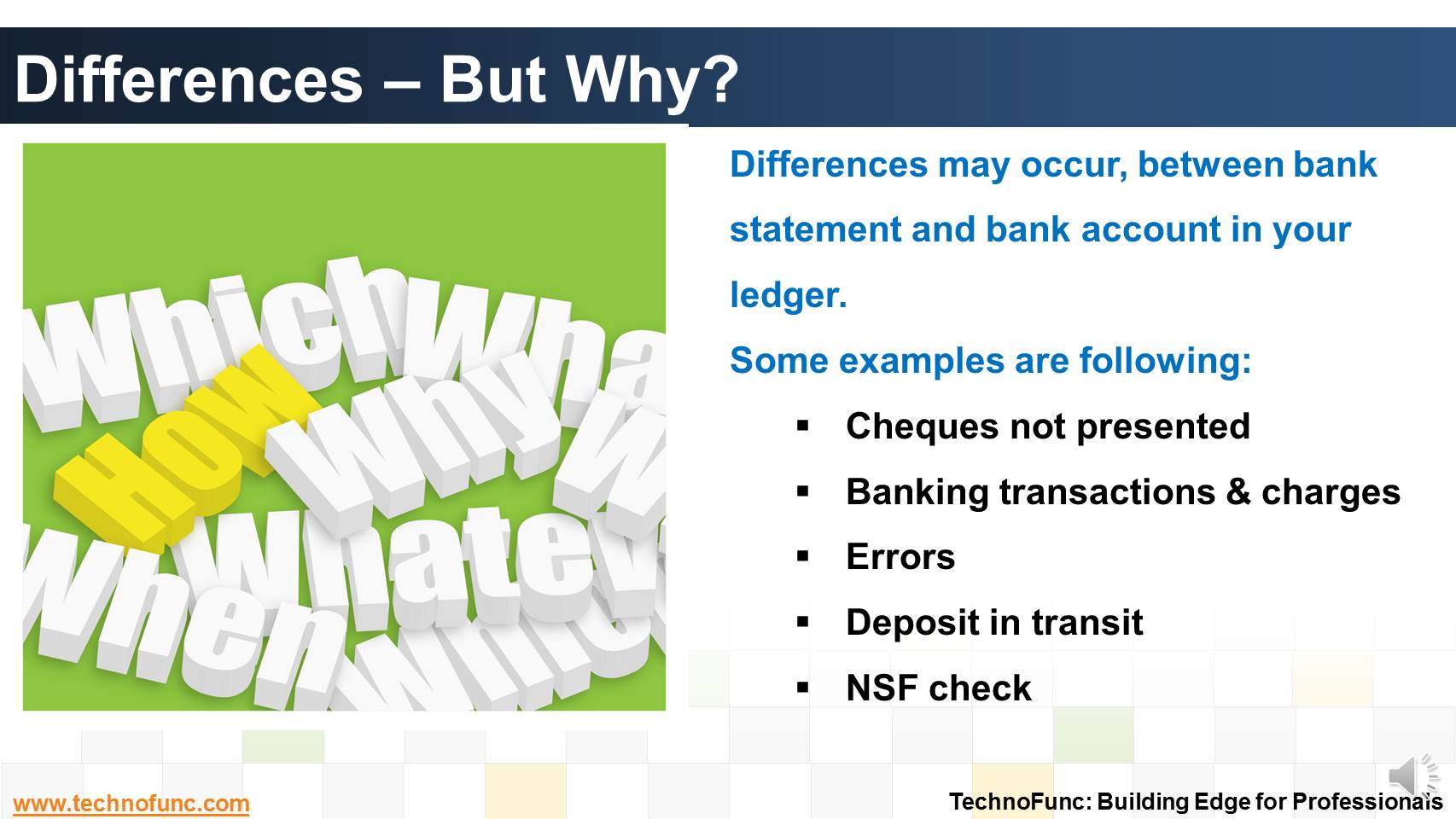- Home
- Business Processes
- Industry Knowledge
- Aerospace Industry
- Automotive Industry
- Banking Domain
- BFSI Industry
- Consumer/ FMCG Industry
- Chemicals Industry
- Engineering & Construction
- Energy Industry
- Education Domain
- Finance Domain
- Hospitality Domain
- Healthcare Industry
- Insurance Domain
- Retail Industry
- Travel and Tourism Domain
- Telecom Industry
- Leadership Skills
- eLearning
- Home
- Functional
- Cash Management
- Differences – But Why?
Differences – But Why?
Bank reconciliation process is targeted to validate the bank balance in the general ledger and explain the difference between the bank balance shown in an organization's bank statement. Learn the reasons for existence of differences between the two.
Reason for Differences:
Such differences may occur, for example, due to following reasons:
1. Cheques Not Presented: A cheque or a list of cheques issued by the organization has not been presented to the bank.
2. Banking Transactions: A banking transaction, such as a credit received, or a charge made by the bank, has not yet been recorded in the organization's books.
3. Errors: Either the bank or the organization itself has made an error while recording transactions.
4. Deposit in transit: Cash and/or checks that have been received and recorded by an entity, but which have not yet been recorded in the records of the bank where the entity deposits the funds.
5. NSF check: A check that was not honored by the bank of the entity issuing the check, on the grounds that the entity's bank account does not contain sufficient funds. NSF is an acronym for "not sufficient funds."
Summary:
Differences may occur, between bank statement and bank account in your ledger. Some examples are following:
- Cheques not presented
- Banking transactions & charges
- Errors
- Deposit in transit
- NSF check

Related Links
You May Also Like
-
Collection Float is the time spent to collect receivables. Collection float is the sum total of time taken by Invoice Float; Mail Float; Processing Float and Availability Float. Explore more!
-
The Cash Clearing process enables you to track amounts that have actually cleared your bank. Till reconciliation happens the amounts are parked in 'Cash Clearing Account'.
-
Before we dive into cash management, let us fist understand what we mean by cash and what constitutes cash in context of cash management process.
-
Although there is no straight forward answer to the question, how to best organize a treasury function, this article provides an generic view of the way large MNCs creates departments or sub-functions within the treasury function.
-
What is Account Reconciliation?
Before you understand the Bank Reconciliation Process it is important to understand what is account reconciliation and why it is carried out.
-
Many different accounts are used in finance. Understand the representation and nature of clearing account in context of accounting, finance and ERP Systems.
-
Effectively using cash management with trade finance products brings tangible benefits to both corporates and financial institutions.Learn the various benefits of cash management process.
-
So many codes in the lines that are there in a Bank Statement. It contain lots and lots of meaningful information that can help automated many tasks. Explore more!
-
Bank reconciliation process is targeted to validate the bank balance in the general ledger and explain the difference between the bank balance shown in an organization's bank statement. Learn the reasons for existence of differences between the two.
Explore Our Free Training Articles or
Sign Up to Start With Our eLearning Courses

About Us
Learning
© 2023 TechnoFunc, All Rights Reserved










